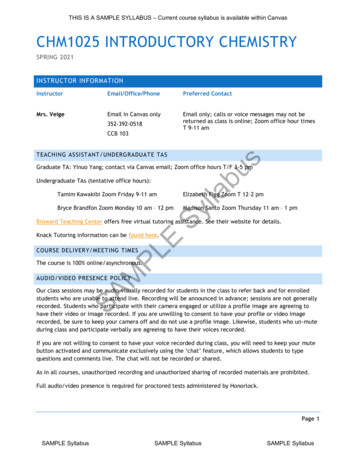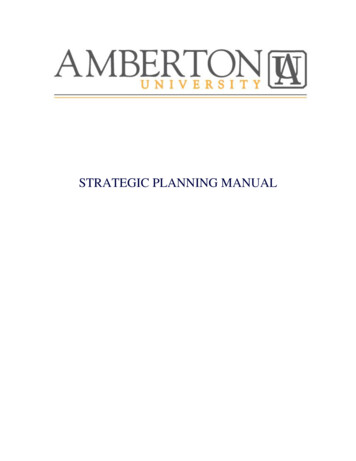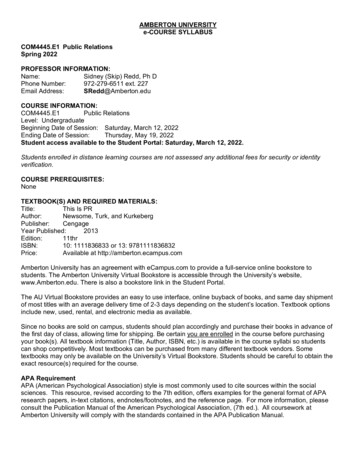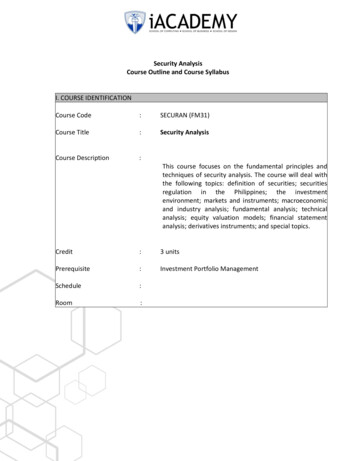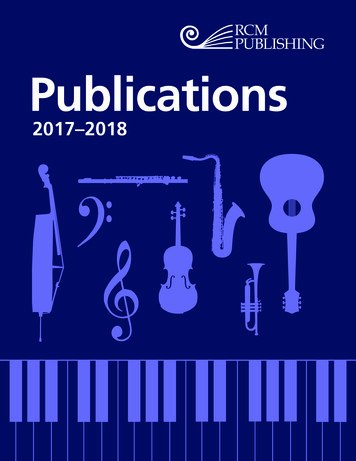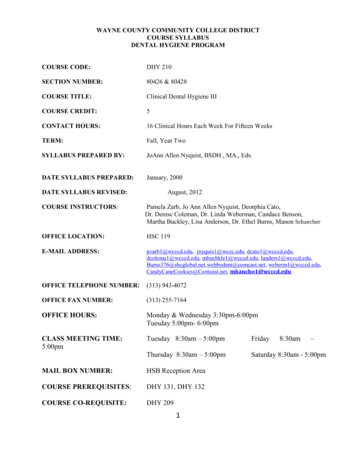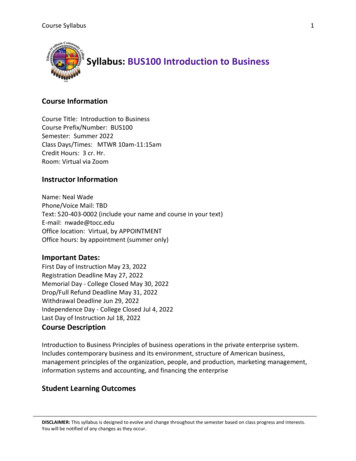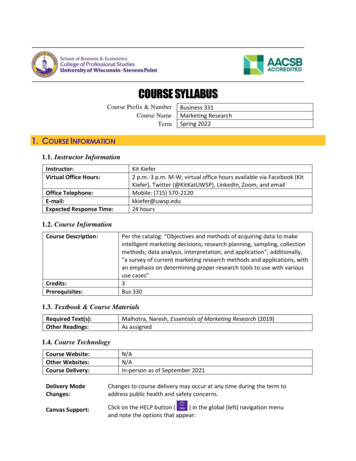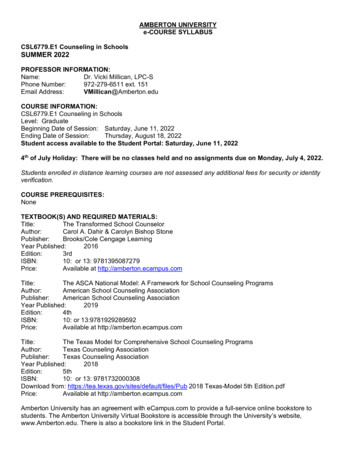
Transcription
AMBERTON UNIVERSITYe-COURSE SYLLABUSCSL6779.E1 Counseling in SchoolsSUMMER 2022PROFESSOR INFORMATION:Name:Dr. Vicki Millican, LPC-SPhone Number:972-279-6511 ext. 151Email Address:VMillican@Amberton.eduCOURSE INFORMATION:CSL6779.E1 Counseling in SchoolsLevel: GraduateBeginning Date of Session: Saturday, June 11, 2022Ending Date of Session:Thursday, August 18, 2022Student access available to the Student Portal: Saturday, June 11, 20224th of July Holiday: There will be no classes held and no assignments due on Monday, July 4, 2022.Students enrolled in distance learning courses are not assessed any additional fees for security or identityverification.COURSE PREREQUISITES:NoneTEXTBOOK(S) AND REQUIRED MATERIALS:Title:The Transformed School CounselorAuthor:Carol A. Dahir & Carolyn Bishop StonePublisher:Brooks/Cole Cengage LearningYear Published:2016Edition:3rdISBN:10: or 13: 9781395087279Price:Available at http://amberton.ecampus.comTitle:The ASCA National Model: A Framework for School Counseling ProgramsAuthor:American School Counseling AssociationPublisher:American School Counseling AssociationYear Published:2019Edition:4thISBN:10: or 13:9781929289592Price:Available at http://amberton.ecampus.comTitle:The Texas Model for Comprehensive School Counseling ProgramsAuthor:Texas Counseling AssociationPublisher:Texas Counseling AssociationYear Published:2018Edition:5thISBN:10: or 13: 9781732000308Download from: https://tea.texas.gov/sites/default/files/Pub 2018 Texas-Model 5th Edition.pdfPrice:Available at http://amberton.ecampus.comAmberton University has an agreement with eCampus.com to provide a full-service online bookstore tostudents. The Amberton University Virtual Bookstore is accessible through the University’s website,www.Amberton.edu. There is also a bookstore link in the Student Portal.
The AU Virtual Bookstore provides an easy to use interface, online buyback of books, and same day shipmentof most titles with an average delivery time of 2-3 days depending on the student’s location. Textbook optionsinclude new, used, rental, and electronic media as available.Since no books are sold on campus, students should plan accordingly and purchase their books in advance ofthe first day of class, allowing time for shipping. Be certain you are enrolled in the course before purchasingyour book(s). All textbook information (Title, Author, ISBN, etc.) is available in the course syllabi so studentscan shop competitively. Most textbooks can be purchased from many different textbook vendors. Sometextbooks may only be available on the University’s Virtual Bookstore. Students should be careful to obtain theexact resource(s) required for the course.LINKS TO COUNSELING HANDBOOKSMA in Professional A in Marriage and Family 021 MFT Handbook.pdfMA in School 1-2022%20School%20Counselor%20Handbook.pdfAPA RequirementAPA (American Psychological Association) style is most commonly used to cite sources within the socialsciences. This resource, revised according to the 7th edition, offers examples for the general format of APAresearch papers, in-text citations, endnotes/footnotes, and the reference page. For more information, pleaseconsult the Publication Manual of the American Psychological Association, (7th ed.). All coursework atAmberton University will comply with the standards contained in the APA Publication Manual.SCHOOL COUNSELING PROFESSIONAL CERTIFICATE PROGRAM CHANGEBeginning Fall 2019, there will be three practicums: CSL6870, CSL6875, AND CSL6880. The TExES (TexasExamination of Educator Standards) must be passed before enrolling in CSL6870. The TExES applicationform and practice tests are located in the TExES Review Course in Moodle. The Application and Contract arerequired at the first meeting of CSL6870 Practicum I and are in the Review Course. Effective September 1,2019, the Master of Arts School Counseling degree will be a forty-eight (48) hour degree program for studentsentering the program.COURSE COMPETENCIES:The following represents the course competencies for this class. Competencies are equivalent for all lectureand distance learning courses. Following each competency is the assignment used to gain mastery of this areaof study.The course presents a comprehensive review of counseling in schools. Students will define the roles andfunctions of school counselors. Emphasis is placed on a learner-centered process that includes organizing,planning, designing, implementing, and evaluating a comprehensive counseling and guidance program. TheTexas Developmental Plan as well as the American School Counseling Association Models will be reviewed asrelated to the school counselor job.UPON COMPLETION OF THE COURSE, THE STUDENT WILL BE COMPETENT IN:1. Understanding the roles and responsibilities of the school counselor along with other professionals in theschool with regard to the guidance and counseling program.2. Demonstrating knowledge of the components of a developmental guidance and counseling program,procedures for implementing, evaluating, and modifying the developmental guidance and counselingprogram as necessary to meet the needs of all students.3. Demonstrating how to assess the needs of students in a school and plan a proactive program that reflectsstudent needs.4. Applying knowledge of procedures for developing a guidance curriculum (e.g., establishing learning goalsand objectives, indicators of competence, expected results, and evaluative criteria).5. Understanding the use of prevention approaches and intervention strategies to address student concerns.
6. Guiding students to develop age-appropriate knowledge and skills in the areas of self-confidence,motivation to achieve, decision making and problem solving.7. Discussing effective referral procedures to facilitate the use of special programs and services.8. Explaining strategies for effective internal and external communication.9. Illustrating consultant and/or coordinator roles of school counselors.10.Demonstrating how to work collaboratively with the school community to promote the integration of theguidance and academic curriculum.11.Demonstrating personal assessment of leadership aptitudes and capabilities for school counselor on theacademic leadership team.12.Demonstrating knowledge of procedures for consulting with teachers, administrators, and others to provideprofessional expertise and enhance their work with students.13.Applying school data to guidance curriculum development.14.Integrating national and state models into guidance curriculum development.15.Accessing national and state legislation related to school counselor job description.16.Articulating methods of school counselor accountability.17.Analyzing programs designed to develop college/career readiness.COURSE POLICIES:(Late work will receive a 2-point per day deduction in grade. Zoom meetings will be scheduled. Attendance atZoom meetings is strongly recommended.Student’s ResponsibilitiesThis syllabus contains information, policies, and procedures for a specific course. By enrolling, the studentagrees to read, understand, and abide by the policies, rules, regulations, and ethical standards of AmbertonUniversity as contained in the current university catalog and schedule of classes.Attendance Policy:Regular and punctual class attendance and engagement is expected at Amberton University. In case of anabsence, it is the student’s responsibility to contact the professor as soon as possible. If a student intends onwithdrawing from a course, it is the student’s responsibility to follow the university’s policy on formallywithdrawing from a course. Ceasing to attend classes does not constitute an official withdrawal.Attendance in a lecture course is defined as punctual arrival to, and engagement in, a full lecture session.Attendance in a distance learning course is defined as active participation in the weekly online class sessions.“Active participation” can be defined as: submitting an academic assignment, taking an exam, engaging in aninteractive tutorial, participating in an online discussion forum (or chat session), or initiating (or responding to) acommunication with a faculty member about an academic assignment or the subject matter of the course. Astudent not meeting these requirements may be dropped at the discretion of Amberton University.Plagiarism PolicyPlagiarism is the presentation of someone else’s work as though it were your own. If you use another person’swords, ideas, or information; or if you use material from an outside source – whether a book, magazine,newspaper, business publication, broadcast, speech, or electronic media – you must acknowledge thatsource. Plagiarism is a violation of the University’s code of student ethical conduct and is one that is takenseriously. Amberton University operates on an honor system; therefore, honesty and integrity are essentialcharacteristics of all who are associated with the institution. All Amberton students are expected to abide bythe honor system and maintain academic integrity in all their work. Amberton University and its instructorsmonitor student work for plagiarism and reserve the right to submit such work to technology-based plagiarismdetection services and applications at any time.Students agree that by taking this course, all required assignments may be subject to submission for a textualsimilarity review to Turnitin.com for the detection of plagiarism. All submitted papers will be included as sourcedocuments in the Turnitin.com reference database solely for the purpose of detecting plagiarism in futurepapers. Use of Turnitin.com service is subject to the Usage Policy posted on the Turnitin.com website.
Turnitin is a writing improvement and plagiarism prevention tool which uses special algorithms, to comparetext-based student submissions to the Turnitin database and other online sources. Turnitin produces adetailed similarity report that can be customized and viewed by instructors and students.Turnitin “Draft Coach” is a Google based add-on to Turnitin which supports students in developing high-qualityacademic writing; and serves as an integrity coach. Draft Coach, helps address errors and improve the qualityof student’s writing by highlighting grammar mistakes, identifying incorrectly cited sources, and scanning forsimilarity across several databases. By providing formative feedback on how to address citation issues,incorrect grammar, and matches with the Turnitin database, Draft Coach provides explanations to helpstudents become more confident writers, capable of producing higher quality work both in academics and inthe workplace.COURSE OUTLINE AND CALENDAR:WeekTopicAssignmentWeek One:June 11-17School Counselors asLeaders & advocatesWeek Two:June 18-24Leadership inAdministrative TeamImplementing theASCA ModelWeek ThreeJune 25-July1Week FourJuly 2-8Week FiveJuly 9-15School Counselors asAdvocatesRead TTSC:Chapter 1ASCA Position StatementsASCA Model Preface,Intro, Exec. Summary &Appendices A & BTEXAS Model Sections 1&2TTSCC: Chapters 3 &4ASCA PositionStatements: High StakesTesting: Test PrepPrograms, Retention,Social Promotion & AgeApprop. PlacementRead TTSC: Chapter 5Week SixJuly 16-22Working with SpecialNeeds StudentsCompetenciesCovered1-17Due Date1-17ZOOM MeetingWednesday, 7:00p.m. (Invitation onMoodle)1-17Leadership ActivityDue: July 2EXAM 1ASCA Model Deliverysystem Accountability& data-drivendecision-making,Special needsstudents06-17 Post on IntroForum &Submit StudentInformation FormEXAM due: 07-09Read: TTSC Chapters 7 &8ASCA Model Sections 1 &4ASCA PositionStatements: SchoolCounseling Programs, etc.TEXAS Model: Section 3 &4Read TTSC: Chapters 10& 11ASCA Model:Section 3ASCA PositionStatements:Gifted/Talented, MTSS,Disabilities, Character Ed,.Peer Support Prgms, SafeSchools thru ConflictResolution &CrisisResponse1-17ZOOM MeetingWednesday, 7:00p.m.1-17TEXAS ModelAssignmentDue: July 23
Week SevenJuly 23-29EXAM 21-17Zoom Mtg.Wednesday,7:00pmEXAM 2 Due: July30Week EightJuly 30August 5School Counselors asConsultantsWeek NineAugust 6-12Preparing students forCollege & CareerTransitioning into fieldof counselingPersonal GraduationAssignmentWeek TenAugust 13-18GRADING CRITERIA:CSL6779-Counseling in SchoolsLeadership Activity20%Texas Model Activity10%Classroom Guidance Activity20%Personal Graduation Plan20%Exam One15%Exam Two15%Total:100%Graduate92 – 10082 – 9172 – 8162 – 71Below 62ABCDFRead TTSC Chapters 12 &13ASCA Model Section 3ASCA Position PapersId & Identification,Prevention of BehaviorsHarmful/Students at Risk,School Family CommunityPartnerships: Use nonschool credentialedpersonnel in schoolcounseling programs, useof support staff in schoolcounseling programTEXAS Model-Appendices(p. 155-181)Read TTSC-Chapters 14 &15ASCA Position Papers:Career Development, postsecondary planning &recruitmentTEXAS Model:Section 51-17ClassroomGuidance LessonPlan AssignmentDue: August 61-171-17PersonalGraduation PlanAssignment Due:Sunday, August 14
GRADE NOTIFICATION AND INSTRUCTOR FEEDBACK:A successful distance learning experience requires a flow of communication between instructor and studentthroughout the session. Instructor comments are considered essential to the learning process. Therefore,each assignment/exam submitted will be reviewed, graded, and returned to the student in a timely manneralong with the appropriate commentary. Students should carefully review all comments.Final grades are processed approximately one week after the last day of the session and may be located in theMy Grades section of the online registration portal as well as being emailed to the student’s AmbertonUniversity email. Amberton University staff will not release grades over the phone. University instructors willnot leave a message with comments or grades in any type of media that is not secure.For questions regarding grades after the semester has ended, students should use their university emailaccount and contact the instructor at the faculty email address as provided above in Professor Informationarea.Incomplete GradesAn “I” (incomplete grade) is given at the discretion of the professor and may be given only when an emergencyor illness prevents the student from completing course requirements. Should an “I” be granted, the student has30 days from the end of the session to complete the conditions of the incomplete. An “I” which is not properlyremoved within 30 days following the session enrolled will become an “F” grade.How To Withdraw from a CourseTo be official, the class withdrawal must be in writing and signed by the student requesting the withdrawal; nowithdrawal is accepted verbally. Please review the “Schedule of Classes” (online or in-print) for procedures forclass changes or withdrawals and the refund policy and schedule.COURSE DELIVERY METHODOLOGY:This course is offered as a distance-learning course through the Moodle Learning Platform. Amberton’sdistance learning courses, called e-Courses, are identical to classroom courses in terms of learning outcomes,competencies, and instructor expectations. A student choosing to take an e-Course must have the followingskills and technical capabilities:1. Access to the Internet2. General knowledge in:Internet browser settings and configuratione-mail and file attachmentsUploading and downloading filesUsing a word processing package3. Ability to conduct on-line researchStudents who have not mastered these skills should not enroll for this course but should consider enrolling inMIS2110 Computer Concepts and Internet Technologies for instruction in these areas.HOW TO ACCESS YOUR COURSE:Through the Amberton University Student PortalStudents enrolled in distance learning courses using the Moodle Learning Platform may access the coursethrough the Amberton University Student Portal. The site may be accessed through the University’s mainpage (http://www.Amberton.edu) or at http://apps.Amberton.edu. After selecting the “Student Portal” link,you will be prompted for a Username and Password.Use your assigned username and password (AUID) as described below to enter the AU Student Portal:Username your capitalized firstname initial lastname last 3 digits of your SSN.* Use your name exactly as it is listed on the University’s records, including any suffixes orhyphenations, such as Jr, Sr, or II, as a part of your username.
For example: James Jones, Jr.Username: JJonesJr789SSN: 123-45-6789Password your Amberton University ID# (AUID) including the dashesFor example: 04-999-999Once your login has been validated, you may select from a variety of menu options, including yourindividual E-Course, email account, Remote Research, General Tools, all Syllabi, Research Tutorials andElectronic Instructor Folders (FTP).If you are accessing the Student Portal from a public or shared computer, close the browser completelywhen finished, or click on the Logout button. For security purposes, no other person should have access toyour Username or Password. If you feel your information has been compromised or if you experiencetechnical difficulties, contact the e-course system administrator at: e-sysop@amberton.eduIf you have lost or do not know your Amberton ID#, please contact the Student Services Office 972/2796511 or advisor@Amberton.edu for a replacement AUID card. You must know your Amberton ID# to gainaccess to the course and to send email to your professor.Through the Amberton University Moodle WebsiteStudents enrolled in distance learning courses using the Moodle Learning Platform may also access thecourse by going to: http://moodle.Amberton.eduFor those utilizing Moodle for the first time, the username and password for the Moodle Learning Platformwill be emailed to the student’s University email account prior to the start of the course. For those returningto Moodle who do not remember their username and password, click on the link “Forgotten your usernameor password” available on the Moodle log in page (http://moodle.Amberton.edu). Otherwise use the sameusername and password as previous session.Moodle Tutorial:Upon successful log in and access to the Moodle learning platform, there is a Student Moodle Tutorials courseavailable, to learn about the basics of Moodle. Simply click on the link for the Student Moodle Tutorials andread through the various learning topics: Navigating; Communicating; Assignments & Exams; Grades; andStudent Resources.COURSE COMMUNICATIONS:Students will communicate with faculty through the Moodle Learning Platform or the Amberton University emailsystem.Each student enrolled is assigned an Amberton email account, which gives the student access to theAmberton email system (my.Amberton.edu). This email account is provided by Google Apps for Education.Students are encouraged to check their email regularly for university news, notices, and to communicate withinstructors.The student’s assigned email address would be Username@my.Amberton.eduExample: LJones-Smith789@my.Amberton.eduThe student Username is determined by:firstname initial lastname last 3 digits of student ssn.For example: Linda Jones-SmithSSN: 123-45-6789Email Address LJones-Smith789@my.Amberton.edu
Students will be prompted for a Username and Password when accessing their email account. Use theUsername portion of the email address as the username (Example: LJones-Smith789) and your Amberton ID#(including the dashes) as the password.If you already have a Google gmail account, you might be prompted to add this account to your currentaccount. Click ‘Yes’ and you will be logged into your my.Amberton.edu email account. It will be a separateemail account from your personal gmail account.If you need assistance with your email account, please visit https://support.google.com/mailStudents are responsible for reviewing the “Communication Guidelines” provided on the individual ECourse for specific instructor requirements.Upon completion of a session, all communication and course specific information is removed from the Moodlesystem. If a student needs to maintain a record of communications or assignments, the student is stronglyencouraged to print out or download these items to a disk for their own records.FORMAT AND SUBMISSION OF ASSIGNMENTS:Assignments are to be submitted to the appropriate assignment Drop Box in the Moodle system. Specificdirections and guidelines for submission of assignments are located on-line in the “Communication Guidelines”of the e-course. Due to compatibility issues, Office 2007 files cannot be read by earlier versions of MicrosoftOffice. Before submitting an exercise file, confirm the file is in the proper format for grading by the instructor.INSTRUCTOR/COURSE EVALUATION:Each session, all Amberton students are provided with the opportunity to evaluate their courses andinstructors. The evaluation process is an important one and provides students with an anonymous andconfidential way to give meaningful feedback to the University. Summary information and comments areprovided to faculty after the close of the session. All information provided is anonymous.The Instructor/Course Evaluation will be open for completion during week 9 of the session. An evaluationassignment will be placed in week 9 of the Moodle course, along with the instructions on how to complete theevaluation. Prior to week 9, the University will send out an email containing instructions and dates for theevaluation period.TEXAS EDUCATION AGENCY COMPETENCIES:This course addresses the School Counselor Competencies set forth by the Texas Education Agency. Thesecompetencies are listed by course on the University’s ftp site (ftp://ftp.amberton.edu/cslinfo/AU TEA).RESEARCH RESOURCES:The library provides access to full-text, and peer reviewed articles, and digital research tools. Students cansearch Library holdings through the online catalog and databases search engines available on the librarywebsite or browse the physical library space and holdings located at the Garland campus.Research items not contained in the Amberton Library collection can be located through interlibrary Loan (ILL)or through the TexShare program with the help of the library staff. Students with questions about availableservices, resources, or research, may contact the library via email at Library@amberton.edu.RESEARCH ACCESS:Databases can only be accessed by authorized users, and students at Amberton must enter their Amberton IDcredentials-same as Moodle login-to gain access when off-campus. Use an Amberton website, such as theUniversity site (Amberton.edu) or the library site (Library.amberton.edu) to find links to databased and digitalbooks. Online resources are available all day, every day.Library Live Chat FeatureLibrary staff are available to assist students with research problems or questions during Library hours througha live online chat feature, telephone, email, “How-to” videos, or in person. The library telephone is (972-279-
6511 ext. 136, 137, or 138. You can email questions to library@amberton.edu or visit the library in person onthe Garland campus for assistance.
Title: The ASCA National Model: A Framework for School Counseling Programs . Author: American School Counseling Association . Publisher: American School Counseling Associat ion . personnel in school counseling programs, use of support staff in school counseling program . TEXAS Model-Appendices (p. 155-181) 1-17 Classroom Guidance Lesson


